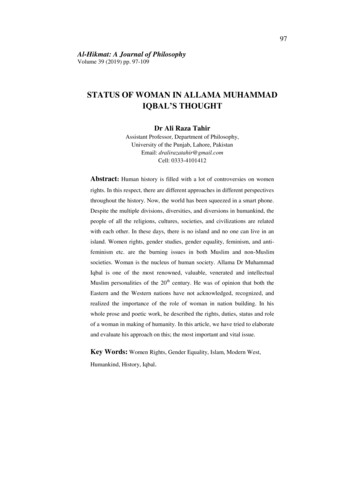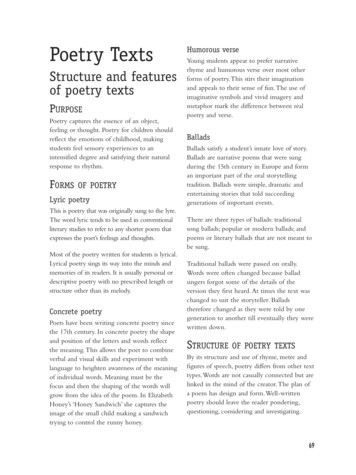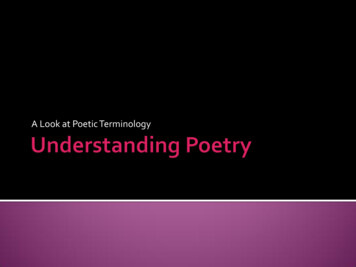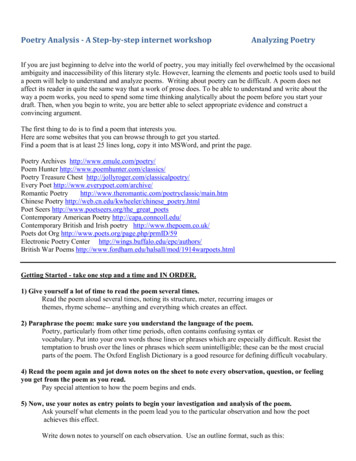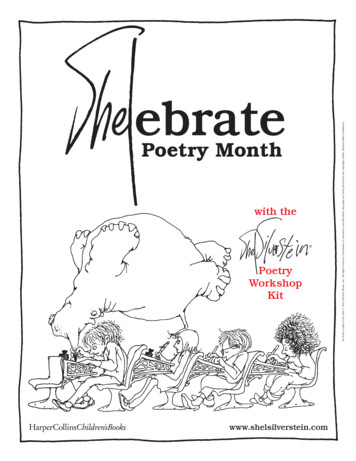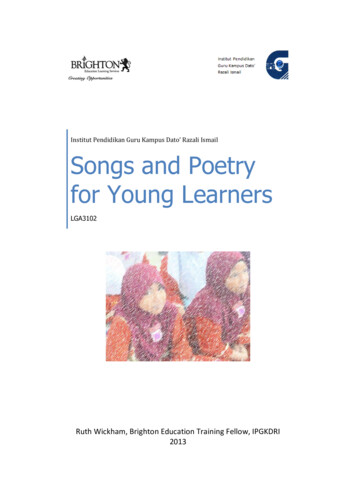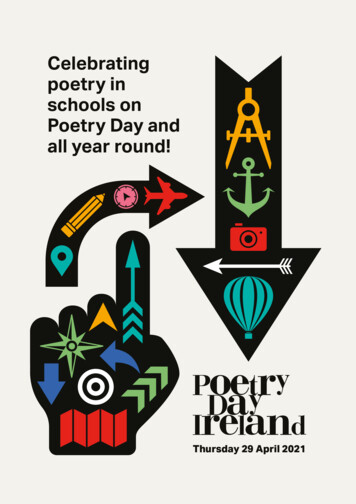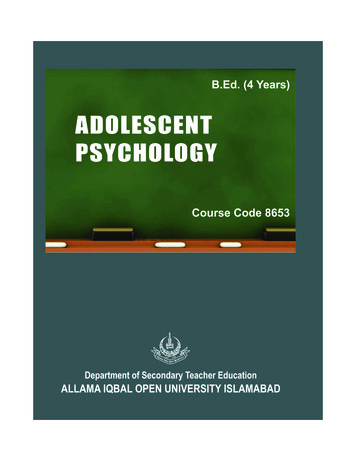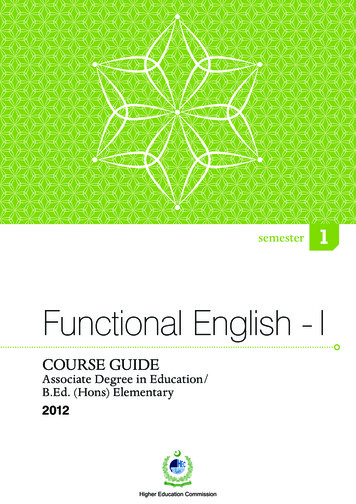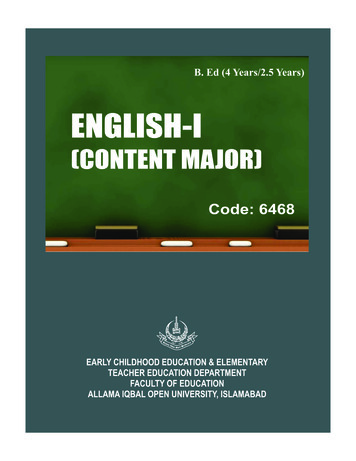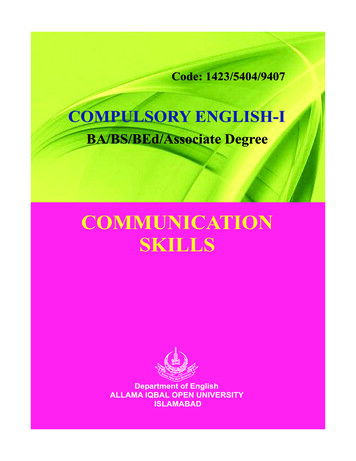
Transcription
BS EnglishStudy GuideClassical PoetryCourse Code: 9054Department of EnglishFaculty of Social Sciences and HumanitiesALLAMA IQBAL OPEN UNIVERSITYi
STUDY GUIDECLASSICAL POETRYBS ENGLISHCourse Code: 9054Units: 1-9DEPARTMENT OF ENGLISHFACULTY OF SOCIAL SCIENCES AND HUMANITIESALLAMA IQBAL OPEN UNIVERSITY, ISLAMABADii
(All Rights are Reserved with the Publisher)Publisher .Allama Iqbal Open UniversityPrinter .AIOU Printing Press, H-8, IslamabadQuantity .5000Price .Rs.iii
COURSE TEAMChairman Course Team:Dr. Malik Ajmal GulzarCourse Development Coordinator:Dr. Rashida ImranWriters:Dr. Saeed SheikhDr. Rashida ImranMs. Ambrina QayyumReviewers:Dr. Rashida ImranDr. Ajmal GulzarDr. Shamim AliEditor:Layout:Fazal Karimiv
Introduction to the CourseDear Students,This study guide on the course of ‘ Classical Poetry’ is developed to introduceclassical poetry as a key genre of English poetry. The primary objective of thiscourse is to provide holistic overview of the poetry written during the classical age.The course is, unavoidably, selective in nature as this genre is highly diverse and isconstantly expanding as a result of extensive body of research and criticalreflections on it. Therefore, the selection of the poets and their works as wellanalyses and discussions are representative rather than exhaustive in nature and aimto demonstrate the wider scope of classical poetry.The course aims at familiarizing you with major poetic developments of theclassical era. It, also, provides a detailed insight into social, cultural, political andreligious conditions of the classical age which greatly influenced literaryperceptions and sensibilities of the selected poets. Brief biographical sketches ofthe selected poets are also included to provide you an insightful perspective intoliterary geniuses in making. The course describes key terms, critical concepts andfundamental literary theories related to this genre and is expected to inculcate basicknowledge and develop essential skills required for advancing in a more detailed,critical and theoretical exploration of this particular genre of English poetry.However, it is pertinent to mention here that our primary objective was toprovide you basic orientation to critically approach the course so that you may beable to appreciate literary beauty, value and worth of poetic excellencies of theclassic age independently. Therefore, it is advised that you thoroughly read the coretexts prescribed for this course. As, it is evident that contextual sensibility is highlydesirable in appreciating the true meanings of a literary text in its entirety, thereforeyou must situate the selected poetic works in their social, cultural, historical,political and religious contexts for detailed critical analyses and interpretations.Moreover, as majority of the prescribed core texts are quite lengthy, so it is notdeemed appropriate to include them in this study guide. However, as the selectedtexts are chief representative of the classic age, so these are readily available onlineas well as in printed versions. Therefore, you are expected to study the original orstandardized versions of the core texts specially the ones which were written in oldEnglish. You may consult their modern English versions in case of any difficulty.You must realize the fact that detailed study of the selected works as well as an indepth analysis of extensive critical work produced on them is the key to success.Course Development Coordinatorv
Objectives of the CourseAfter reading this study guide thoroughly as well as the core texts prescribed forthe course, you will be able v.define the terms classical and classicismdescribe the associative values of classicismidentify the descriptive features of neo classicismidentify unique features of classical poetrytrace a comprehensive chronological development of classical poetrysituate the core texts in their social, political and religious contexts toappreciate their poetic valuecomprehend various influences on the selected poets responsible for thedevelopment of their poetic geniusenlist the poets who were the chief representative of classical ageanalyze the major themes of the poetry produced by the selected poetsdemonstrate the effects of various literary traditions on classical poetrycritically assess the stylistic features of the poetry produced by the selectedpoetsappreciate the contributions made by the selected poets in strengtheningclassical traditions of poetryexplain intellectual design and major themes of the classical poetrycritically analyze some of the representative poetic compositions of theperiodprovide a detailed critique of the representative poetry written during theclassical periodvi
CONTENTSUnit 1:Classical Poetry.1Unit 2:Geoffrey Chaucer.10Unit 3:Edmund Spenser .20Unit 4:William Shakespeare .32Unit 5:John Donne .41Unit 6:John Milton . . .58Unit 7:Paradise Lost: Textual Analysis .70Unit 8:Alexander Pope.83Unit 9:The Rape of the Lock .93Suggested Readings .105vii
UNIT-1CLASSICAL POETRYWritten By: Dr. Muhammad Saeed SheikhReviewed By: Dr. Rashida Imran1
CONTENTSOverview .3Objectives .31.1Classical: Definition and Description .31.2 Classicism: Definition and Description.41.3 Neo Classicism and its Distinct Features .41.4 Representative Poets of the Classical Period .51.5 Prescribed Texts for the Course .8Summary Points.8Self-Assessment Questions .92
OverviewThis unit introduces classical poetry as a distinct genre in English poetry and describes key termsand basic concepts related to it. It also traces the development of English poetry during theclassical period which ranges from 1370 -1744. The unit highlights the impact of classical ageand poetry produced during this period on contemporary English poetry. The unit, also, brieflyintroduces the poets who are the chief representative of the age besides their famous poeticworks prescribed for this course.ObjectivesAfter studying this unit, you will be able toi.ii.iii.iv.v.vi.define the terms classic, classicism and neoclassicism and bring out the distinct featuresof eachdetermine how the social, religious and political conditions of the English society duringthe 14th century to the 18th century- the age of Chaucer to the age of Pope influencedcontemporary English poetryidentify the poets who are chiefly associated with this period ranging from 14th centuryto 18th centuryunderstand the reasons why they are categorized as ‘classical’describe the terms: medieval, Renaissance, Augustan and metaphysicaltrace the developments and changes English poetry has undergone during the years 1370- 1744The term classic has been used to convey various meanings in literature and art. According toOxford Advanced Learners Dictionary (2002), classic describes something that is accepted asbeing of very high quality and one of the best of its kind. It is also used to describe a typicalexample of something or something elegant but simple and traditional. According to the PenguinDictionary of literary terms and literary theory, “A number of meanings maybe distinguishedbut principally (a) of the first rank or authority (b) belonging to the literature and art of Greeceand Rome (c) a writer or work of the first rank and of generally acknowledged excellence withreference to literature and art”. With special reference to the study of classical poetry we willprefer to use the term to mean Gracio-Roman models followed by the European literary artistsbecause of the rules and canons evolved from the works of the ancient and established as thestandard to evaluate the works of the successive generations of artists both literary and nonliterary. The term may, however, be applied to define exceptional and highly eulogized workwhich also enjoys an authority.Though the poets and their works included in this course are neither strictly the imitations of theancient models, nor do they bare the stamp of their authority, however, they are acknowledgedas the best examples to represent the contemporary trends and classical standards of judgementas well as their wide spread popularity. We will apply the term classical not only for conveniencesake but to understand and appreciate these poets and their selected poetry to determine theirplace and influence on the future poets and their works.1.1 Classical: Definition and DescriptionLet us examine what does the term classical stand for and how far it is justified to label them asclassical. The term classical, according to Oxford advanced learners dictionary, is described as“A form of traditional western music and other things that are traditional in style it is alsoused to talk about things that are connected with the culture of ancient Greek and Rome”. ThePenguin Dictionary of literary terms and literary theory describes the term thus, “The adjective‘Classical’ normally applies to anything pertaining to Greece and Rome with an implication ofthe best, a standard of excellence worthy of emulation. When applied to literature, the word3
classical suggests that the work has the qualities of order, harmony, proportion, balance anddiscipline In short, nothing can be taken away from it or added to it without doing it someinjury”. Furthermore, “Classical like classic is a term which has been used in diverse meaningsover the centuries. Overtime, however, this term came to signify any Greek or Roman worksdeemed particularly worthy and subsequently Gracio-Roman writing in general. Still later, itcame to be used to refer to texts that imitate the Gracio-Roman traditions and even to ones that,although not written in imitation of the ancients (and even perhaps within thematic or stylisticopposition to them) were particularly worthy. Classical can also be used to describe works thatexhibit the qualities or characteristics of Classicism, a complex set of attitudes and standardsthat classicists, scholars of Gracio-Roman antiquity, believe to be reflected in the art,architecture, history, philosophy, politics and literature of ancient Greece and Rome (TheBradford Glossary of Critical and Literary Terms, 1998)”.1.2 Classicism: Definition and Description‘Classicism’ is another important term which signifies a style of art and literature that is simpleand elegant and is based on the styles of ancient Greece and Rome. Classicism was popular inthe 18th century. The term is also used to signify a complex set of attitudes, beliefs and valuesthat marked the cultures of the ancient Greece and Rome. However, classicism when applied toliterature and art is not used in the cultural and social context of the ancient civilization of Greeceand Rome. In the context of literature, it is used to signify the style and certain characteristicswhich make the achievements of antiquity and literature critically admired and valued. In thecontemporary times, is not used exclusively to refer to Greek and Roman works, the term canbe used in connection with any work that exhibits some combination of these qualities thatthereby captures something of the spirit of the ancient Gracio-Roman tradition. Englishliterature has been strongly marked by classicism, the ideals and characteristics of which wereresurrected most notably in the Renaissance and the subsequent movement we referred to asNeo-Classicism (The Bradford Glossary of Critical and Literary Terms, 1998).1.3 Neo Classicism and its Distinct FeaturesNeo classic period in English Literature usually ranges from 1660 – 1780. In other words, thisperiod begins with Dryden and ends roughly with Dr. Johnson’s death (1784). The famous poetswho belong to this period are Dryden (1631-1700) and Pope (1688-1744), the writers of prosefiction and nonfiction include Addison (1672 – 1719), Fielding (1704 – 1754) and Goldsmith(1730 – 1774). Neo Classicism stressed rules, reason, harmony, balance, restraint, decorum,order, serenity, realism and form – above all an appeal to intellect rather than emotion (BradfordDictionary of Literary Terms, 1998). The neo classicists believe that the aim and office ofliterature and art is to both instruct and delight. They do not favour the belief that literatureshould give mere delight which is opposite to the later theory of art for art’s sake. In the poetryof W.H. Auden, T.S. Eliot, Robert Frost and Ezra Pond, we may see the revival of neo classicismwith the modification for compatibility with the 20th century theory and practice. In literarytheory and practice, most writers of this period were traditionalists and they had a great respectfor the classical authors and especially the Romans, who they believed, had established andperfected the principal literary genres for all time. The neo classicists believe that the propersubject of the art was humanity in general and not individual. Their general assumption was thathumanity is imperfect and limited. It is by the power of reason that human civilization can beperfected.The neo classicist poets and literary theorists believe that poetry is like craftsmanship and canbe improved by labour. Therefore, they honoured the rules and adhered to these rules in theirpractice of poetry. As far as language of poetry is concerned, they insisted upon the principlethat it should be a special, formal and dignified diction. Language of daily business andtransactions used by common man cannot be the language of poetry. Versification and the useof metre is essential for poetry which makes it distinct from the prosaic. Poetry, according tothem, is not an inspirational activity rather it is a willed activity. Poet is not a maker but arepresentative – a realistic and photographic representative of society, its culture, beliefs andvalues. Poetry of the neo classist age is sometimes called Town Poetry which is the reflection4
of life as ‘it is’, not ‘what it ought to be’. A poet is objective in his expression and makes hisexpressions true to life. According to the neo classist theory, poetry should appeal to reason andintellect rather than emotions and feelings. It was emphasized that poetic activity should aim atthe moral and intellectual uplift of the readers. Satire and irony are, therefore, pervasive in proseand poetry to make their writings reformative and instructive for the readers.1.4 Representative Poets of the Classical PeriodThe poets included in this course are chief representative of the classical period. They are calledclassics because of their contributions for the development of English poetry during 14th to 18thcenturies. Their works are, undisputedly, of the first rank and acknowledged as excellent. Nocritic can deny Chaucer as father of English poetry, Spenser’s title as Poet’s poet, Shakespeareas dramatist par excellence whose plays whether tragedies, comedies, tragical comedies,dramatic romances, historical plays occupy the stage even in the modern times. No study ofdramas is complete without reference to Shakespeare. As a writer of sonnets, he is no less a poetthan the greatest poets of the world. Milton gave sublimity to English language through his greatwork Paradise Lost, Jhon Donne’s metaphysical poetry occupy an unchangeable place in theevaluation of English Poetry. Alexander Pope has been acknowledged as the pioneer of neoclassical school of poetry. The following poets and their poetry have been prescribed for thiscoursei.ii.iii.iv.v.vi.Geoffrey ChaucerEdmund SpenserWilliam ShakespeareJohn DonneJohn MiltonAlexander PopeDryden was the first to give to Chaucer (1340 -1400) the title ‘father of English poetry’ whichhas not been challenged throughout the development of English poetry. Chaucer has been readwith interest for his humour and the characters who are still believed to be the human beingswith whom we share the essentials of human nature and shall enjoy the universal popularity.Dryden writes in his preface to fables “ I hold him in the same degree of veneration as theGrecians hold Homer or the Romans Vigil. He is a perpetual fountain of good sense; learned inin all Sciences; and therefore, speaks properly on all subjects”. Chaucer is a realist who presentsbefore us life as he sees it and does not shape it as it ought to be. He observes life and the worldfrom a purely human point of view. For Arnold “it is by a large free sound representation ofthings, that poetry - the high criticism of life has truth of substance; and Chaucer’s poetry hastruth of substance”. However, despite all the praise Arnold reserves for Chaucer, neverthelesshe maintains that he is not one of the great world poets on account of his lack of high seriousness.G. K. Chesterton, a famous 20th century wit, disagrees with Arnold. Professor Langston Iowesalso contends with Arnold in his remarks, “finally I'm not concerned about Chaucer’s allegeddefect of the high and excellent seriousness which Aristotle attributes to the grand virtues ofpoetry”. He believes that Chaucer is among those poets who teach by a delightfulness. Chaucerhas been applauded for his humour and is believed to be the first great humourist in Englishliterature. He has been gifted with the psychological insight and a tolerant view of the humanlimitations, the qualities which make him a satirist without a sting. His right range of humourdoes not let his readers to laugh with derision at his characters.They look at their weaknesses, corruption and even vices with charity and generosity. Chaucer’sworld and men and women who inhabit this world is not utopian. It is a world in which we alllive with human beings who are not ideal, imaginary and revolutionary and romanticallyconceived beings. The characters have hopes and fears like us. They have limitations like us andwhen we recognize the truth about them, we cease to be judges to execute justice but kind andgenerous to punish their weaknesses and levities with laughter. Chaucer's language is free ofany venomous attacks to produce hatred for his characters. He presents the truth of life not likea moralist who has become despaired of man's goodness. He is a reformer with charity.5
Edmund Spenser (1552 – 1599) is another famous poet of English language who is called thepoets’ poet on account of his contributions to English poetry and his influence upon thesuccessive generations of poets. ‘The Faerie Queene’ is a masterpiece which won applause fromhis contemporaries and his successors. Besides this poem, Spencer wrote other poems of poeticexcellence which were admired by the readers. His poem Shepherds’ Calendar published in1579 made Spenser to be declared and acknowledged as the poet of the highest rank. In otherpoems which won no less applause and readership for Spenser are Astrophel (1586); YourHymns; Epithalmion (1595); Prothalmion (1596). Spenser has been a great influence on theEnglish poets of all ages to deserve the title the poets’ poet given by Lamb. According toCompton Rickett, Spenser came at a crucial moment in English poetry. He is the child of theRenaissance and reformation. After reading Spencer, Compton Rickett’s remark is justified thathe is serious and sage like Milton and a humanist with sensuous beauty and southern romance.Spenser's poetry is the blend of high ideals, reformative sobriety with beauty, harmony andromance. He displays his metrical achievement, his rich imagination, his narrative skill, hismoral outlook and his imagery, the qualities which truly justify the title ‘the poets’ poet’.Spenser’s ‘The Faerie Queene’ is a masterpiece which no doubt has been criticized by somecritics as having some technical limitations, but it continues to be held in reverence on accountof multifarious poetic excellencies by poets and critics of all ages. Spenser’s Spenserian stanzais followed by the 19th century romantics and by poets of the successive centuries. Spencer is aclassic poet of English on two accounts; first that we as readers may trace some influences ofthe antiquity in his poetry and second because of his undisputable excellences contributed toEnglish poetry in both form and content.William Shakespeare (1564-1616) received his early education at Stratford school. He leftschool probably at 15. At 18 married Anne Hathaway, eight years his senior. According toCompton Rickett, Shakespeare was of a literary genius whose work is universal in its appeal,but so little definitely known as a man of private citizen. We move in an environment ofguesswork, illumined needed by a few occasional flashes of history. He, further, believes thatmuch of Shakespeare's early life history is only conjecture. Shakespeare's biography we shalldiscuss in the unit on Shakespeare as a poet. Shakespeare had been married for years when hemade up his mind to leave his native city and try his fortune in the great city of London. He wasat the height of his dramatic area in 1601. Playwriting and other literary work brought him threehundred pounds which were raised to over thousand pounds a year.The period of Shakespeare's literary activity extends over 24 years - 1588 to 1612. ComptonRickett broke it up into four sub-periods. During the first period 1586 to 1594, historical playswere written. During 1591 to 1594, Shakespeare emerged as a poet. The second period -1594 to1600 showed Shakespeare as a better and refined dramatist adding to the list of his historicalplays two more plays Henry IV (1597) and Henry V (1595). The comedies taming of the shrew(1595), The Merry Wives of Windsor (1598), Much Ado about Nothing (1599) and TwelfthNight (1600) were written during the second period. The majority of the sonnets were composedin 1594. The third period -1600 to 1608, in which his tragedies predominate, and it is in thisperiod that Shakespeare reached the culmination of his power as a dramatist. The romances Allis Well that Ends Well, Measures for Measures, Troilus and Cressida are essentially tragediesset in a key of forced comedy. They are rich in poetry but have a confused and unpleasantimpression on the mind. The fourth period - 1608 to 1612 opens with tragedy, Anthony andCleopatra (1608) and Coriolanus (1609). Shakespeare wrote Cymbeline (1610), The Tempest(1611) and the Winter's Tale in which he turns again to romance. The tragic period has leftbehind a legacy of spiritual power and imaginative subtlety.With reference to Shakespeare, in this study guide our focus will be the poet and his poetry.Shakespeare is a dramatist and his achievements in writing of various genres of drama will bediscussed in your course based on classical drama. According to Herbert Grierson and J. C.Smith, “Shakespeare was also a poet perhaps in his early work more conscious of himself as apoet than as a dramatist, who was interested in effects which he must have known only a section6
of his audience could fully appreciate. His poetry mainly consists in the form of sonnets, whetherthese sonnets are autobiographical and are the expression of the poet's personal experience oflove like many love poets or it is the imagination transformation of his observations of other’sexperiences into poetry has been a debatable issue for the readers and the critics of Shakespeare.Walter Raleigh agrees with Professor Dowden that Shakespeare sonnets express his ownfeelings in his own person. Raleigh comments “but these sonnets by general consent wereprivate documents they were not intended by Shakespeare for our perusal but were addressed toindividuals and every lover of poetry who has once read the sonnets knows that those who saythat they care not the expression of his own feelings are untrue. It is this quality which makesthem to hold their place with the greatest poetry in the world they are rich in metaphor andvarious in melody but the resources of arts have been subdued to the feeling that inspires themand have given us poems as simple and as moving as the pleading voice of the child”.Shakespeare’s sonnets are not destitute of passion and feelings which is an admitted fact by allthose who love poetry and opine that good poetry is the expression of feelings withoutsensibility. They are the free expression of dramatic possibilities of life. Raleigh asserts that likeSidney, Spenser and Dryden, Shakespearean sonnets are unpredictable without taking intoaccount the background which inspires the poet. He believes that Shakespeare desires to beremembered not for his style but for his love. He has been included in this study guide becausehe is a classic poet as well as a classic dramatist. His influence on the future sonneteers cannotbe denied.John Donne (1572-1631) was the pioneer of metaphysical poetry. He was a Roman Catholic bybirth and his entire family was made to suffer on the account of not denouncing Roman Catholicfaith. However, in his later life Donne deserted Catholicism and converted to Protestantism.Donne was, also, a clergy man and earned fame and repute owing to his unique eloquent stylewhich was reflected through his powerful sermons. He was a well read and well travelled man.His poetry expresses his knowledge and powerful skill of experimenting with the diction. Hispoetry is often written in conversationalist style and is highly argumentative in nature. Heproduced both love and divine poems. John Donne is chiefly famous for his metaphysicalconceits where he ‘juxtaposes heterogeneous ideas’. His love and divine poem cover a vastspectrum of themes ranging from conjugal to divine love. His poems are written in fourteenlines which are customary of a sonnet. Donne used the Italian and the English models for writinghis Holy Sonnets. The sonnet is a suitable form of expression for Donne’s argumentative styleand rational discussions.John Milton (1608-1674) was born in London and is one of the most universally acknowledgedand acclaimed English poets. Milton exhibited a great love for learning right from his childhoodwhich clearly revealed that he would accomplish a great repute and fame in his life. He wasfortunate to have a very conducive learning environment at home as well as at school. Miltonwas trained in Latin, Greek, Hebrew and Italian. He was a true humanist in nature whoemphasized on the need of logic and reasoning. He believed that human beings should be freeto exert self determinism and free will. He was well versed in ancient and modern literatures ofhis times which often find its reflection in his poetry. He had a wide range of resources whetherlinguistic or intellectual at his disposal which are clearly reflected through his poetry. Hismasterpiece is ‘Paradise Lost’ which is the core text prescribed for this course. It is a long epicpoem which presents a medieval them with Renaissance spirit. The aim of Milton was to justifyGod’s ways to man. Loftiness of ideas and sublimity of thought find their best representation inthe ‘Paradise Lost’ which has a universal appeal because of its subject matter which deals withthe first disobedience of man. Milton was greatly influenced by his predecessor Spenser’s work.Alexander Pope (1688-1744) was born in London. He was crippled at the age of twelve by adisease which left him a hunch back. It was an age of anti-Roman Catholicism and Pope wasvictimized on account of his faith in Roman Catholic sect and practice. He was mocked andlaughed at especially by the womenfolk because of his appearance. In Pope's age the poetsfollowed the Gracio Roman traditions. There were strict rules which the poets were expected tofollow, and Pope mastered them more thoroughly and skillfully using them in his poetry. Pope7
is considered as the greatest poet of the classical period. Professor Elton calls him ‘the Princeof classism’. He was intellectual, ambitious and industrious, the qualities that made himprominent among the literary figures of his age. The classical period which is also calledAugustan age was very particular about the rules which governed poetry of that time. It was anage in which poetry was considered as an art and it was by hard work and skill that a poet couldachieve fame and popularity. Pope despite many hardships achieved a place among the poets ofEnglish language which cannot be challenged. The most important of his earlier works is thePastorals. His ‘Essay on Criticism’ was the poem which established him as a great poet. In 1712,Pope’s masterpiece ‘The Rape of the Lock’ was published. ‘The Rape of the Lock’ is the coretext prescribed for this unit shall be discussed in the unit on Alexander Pope. It is written inimitation of the great epic Poet Homer. Pope h
ix. analyze the major themes of the poetry produced by the selected poets x. demonstrate the effects of various literary traditions on classical poetry xi. critically assess the stylistic features of the poetry produced by the selected poets xii. appreciate the contributions made by the selected poets in strengthening classical traditions of poetry
